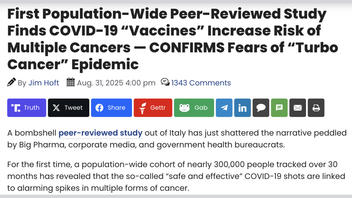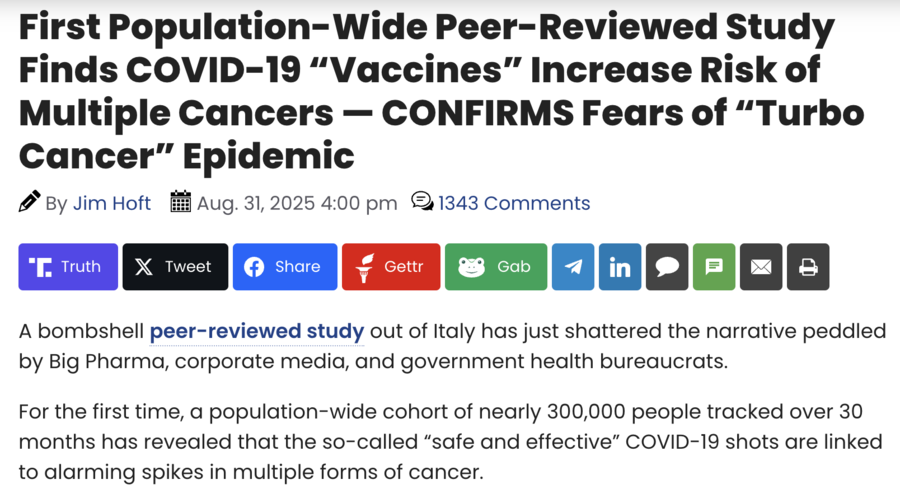
Did a "first population-wide peer-reviewed study" confirm that COVID-19 vaccines cause "turbo cancers"? No, that's not true: The study referred to its results as preliminary. The corresponding author told Lead Stories that more research is needed to confirm the findings about cancer among those vaccinated against COVID-19.
The claim appeared in an article (archived here) published on The Gateway Pundit on August 31, 2025, under the title that reads:
First Population-Wide Peer-Reviewed Study Finds COVID-19 'Vaccines' Increase Risk of Multiple Cancers -- CONFIRMS Fears of "Turbo Cancer" Epidemic.
This is what it looked like at the time of writing:
(Source: screenshot of thegatewaypundit.com)
The article discussed a study (archived here) published in a peer-reviewed scholarly journal, EXCLI, on July 1, 2025. Its authors looked into the data from an Italian province and concluded that, "compared with the unvaccinated, those receiving ≥1 dose showed a significantly lower likelihood of all-cause death, and a slightly higher likelihood of hospitalization for cancer". Yet, the study read:
...these findings are inevitably preliminary.
Lead Stories asked the study's corresponding author -- Professor Lamberto Manzoli of the Department of Medical and Surgical Sciences at the University of Bologna (archived here) -- if the Gateway article accurately represents the research. On September 3, 2025, he replied via email. Manzoli said that the article contains "clear errors" that inflate the risks and continued:
...the problem is the over emphasis: these are inevitably preliminary results, with a large uncertainty around the timing. As you noted, the results were even reversed when a different time point was chosen. The follow-up was short, and we definitely need more data to confirm the findings. Thus, although they are still useful, they must be interpreted with caution, such as 'preliminary data indicate that a slight increase of risk of some cancers could be possible, but they require confirmation', rather than 'COVID-19 vaccines do increase the cancer risk'.
Lead Stories reached out to Dr. William Schaffner (archived here), a professor of medicine in the division of infectious diseases at Vanderbilt University Medical Center and an expert with the Infectious Disease Society of America (archived here). He confirmed that the study doesn't say what social media pages attribute to it. Schaffner pointed out the study's authors exercised caution in describing the results, not necessarily firmly equating correlation and causation and calling for further study. According to Schaffner, one possible interpretation of the findings may have more to do with the vaccine distribution than with the vaccines themselves or a "potential impact of the healthy vaccinee bias" cited in the study:
Healthier people are more likely to get the vaccine because they're interested in their health, and they do many things to protect their health, but in this case, at least in the United States, we targeted COVID vaccine to the less healthy population, older people, chronic illnesses, and they, particularly older people, are more likely to have cancer already when they get vaccinated.


















